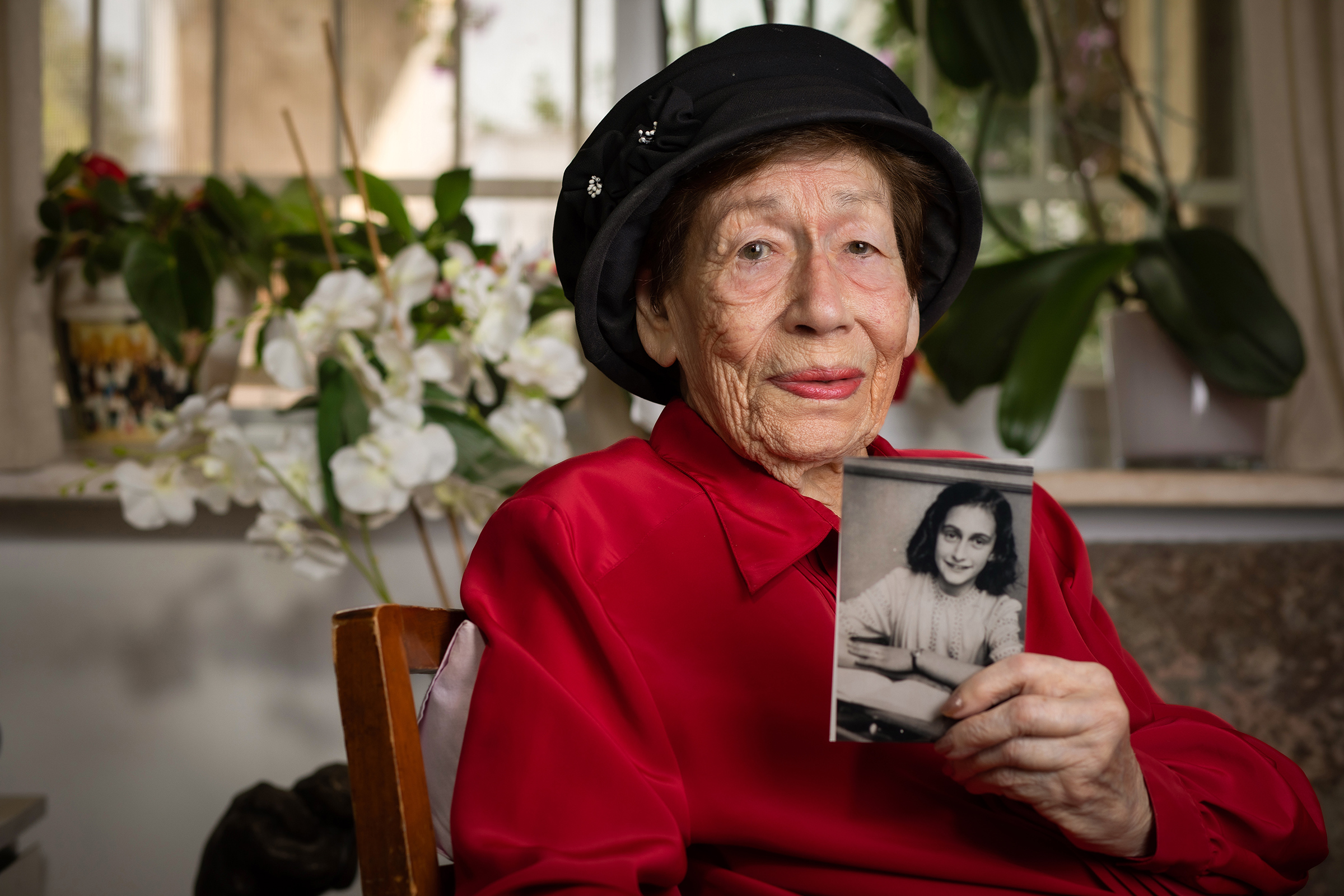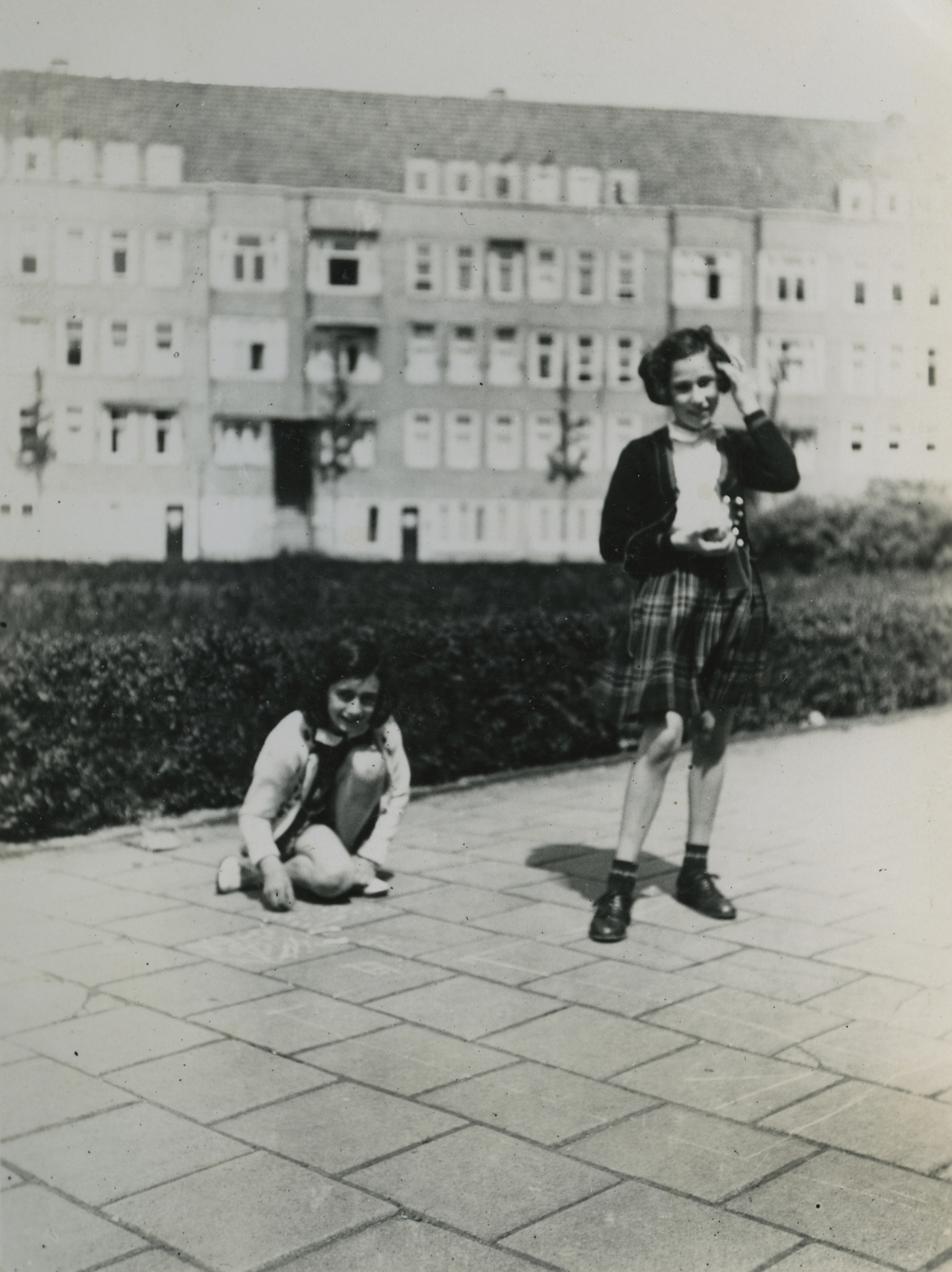
These are independent reviews of the products mentioned, but TIME receives a commission when purchases are made through affiliate links at no additional cost to the purchaser.
In 1934, five-year-old Hannah Pick-Goslar, who had recently moved to Amsterdam after fleeing Nazi Germany with her family, became friends with the girl next door, Anne Frank. Their friendship carried them through a childhood that went from carefree and fun to impossibly tragic as the Nazis eventually made their way to Amsterdam, and both families were sent to concentration camps. In her new posthumous memoir, My Friend Anne Frank, which was co-written by Dina Kraft, Pick-Goslar describes the horrors she survived during the Holocaust and the memories she shared with her best friend. In this excerpt, she reflects on one of their final moments of joy, Anne Frank’s 13th birthday party.
One morning in early June 1942, I was standing on the street whistling our usual whistle under the window of Anne’s apartment. Anne was running a bit late and I was anxious to get started on our walk. I whistled again, more urgently this time, but mid-whistle I stopped and smiled, as I saw Anne flying out of the door. She pressed an envelope into my hands with my name on it.
“What’s this?” I asked, as we started walking quickly towards school. She smiled and watched me open it. An invitation to her 13th birthday party on Sunday, just two days after her actual birthday on June 12.
More from TIME
“Jacque and I typed them on my dad’s typewriter—aren’t they great?” she gushed. On the invitation there was also a cinema-style ticket with my seat number. “Father’s renting a film projector again so we can watch Rin Tin Tin!”
“I can’t wait to come,” I told Anne.
Anne and her sister Margot always had the nicest birthday parties. Mr. and Mrs. Frank would go all out overseeing games and serving Mrs. Frank’s delicious, freshly baked cakes and cookies. Like most of the world, I loved Rin Tin Tin films, even though I was terrified of dogs in real life and would cross the street to avoid one, even if they looked harmless. But Rin Tin Tin, the most famous dog in the world (a German shepherd who conveniently lived in faraway Hollywood), was a hero, friend, fighter, and companion wrapped into one.

Everyone likes their birthday, but Anne was one of those people who really loved it; she would tell anyone who would listen when it was coming up. So everyone seemed to know about it and our entire class of 30 boys and girls was invited to the party, along with old friends like Sanne and a new one, a 16-year-old boy named Hello that Anne liked and who she had been spending time with. Anne told me that Margot had a couple of friends coming too. Of course, all the guests would be Jewish because of the new laws barring non-Jews from Jewish homes, and I thought about how it was the first time our non-Jewish friends from Montessori School or the neighborhood wouldn’t be at one of Anne’s birthday parties.
On the Friday morning of Anne’s birthday, I did our usual whistle under her apartment and waited for her to come down. “Happy birthday!” I shouted as soon as I saw a beaming Anne rushing down her front stoop.
Read More: Anne Frank’s Best Friend’s Memoir Reveals New Details About Their Childhood
“I was so excited I woke up at six,” she told me and then rattled off a list of gifts that had been waiting for her on the dining room table. There were books and a new pair of shoes, and most prized of all was the red, cream, and beige checkered notebook with a pretty metal clasp she had pointed out to her father at Blankevoort, our local bookshop. She told me she was going to use it as the diary she’d always wanted. I wondered if she’d show me any of what she might write but knew better than to ask. At school that day, Anne passed around cookies for the happy occasion and the whole class formed a circle around her and wished her a very happy birthday.
Sunday, the day of the party, was an unusually warm day. I arrived to see the Franks’ living room had been transformed into a cinema. I spotted the projector in a back corner and noticed the rows of chairs lined up as if it were the real thing. I looked at Anne and, as usual, admired how confident and carefree she seemed. Her face was aglow and she fluttered like a butterfly between guests. Her hair looked especially pretty. Anne spent a long time brushing it every night and tried to coax it into curls (without much success) using pins and curlers. Margot poured lemonade from a large pitcher and we all clamored for a slice of Mrs. Frank’s strawberry and cream cake, one of my favorites.
Read More: How Anne Frank’s Family Found a Place to Hide
Among some of our new friends from school who came were Betty Bloemendaal, who was sweet and clever and had the highest grades in our class; Jopie de Beer, who Anne thought was a bit of a flirt; and Eefje de Jong, one of the youngest girls in our class and also one of Anne’s favorites. Among the boys were Jacques Kocernoot, a funny boy who sat right behind us in school, and Werner Joseph, who fled here from Poland. He seemed sweet even though he was awfully quiet. And Appie Riem, who was one of the only other Orthodox kids in the class. It was such fun being outside of the classroom and chatting, sipping lemonade and joking around with one another, about to watch a film together—a rare treat.
It was to be the last party where we were all together. One of the last happy, carefree times for us as children on the cusp of our teenage years. Within two weeks, Anne and her family would vanish. I thought they escaped to Switzerland, but they had gone into hiding. I wouldn’t speak to her again until 1945, inside the Bergen-Belsen concentration camp.
Excerpted from the book My Friend Anne Frank: The Inspiring and Heartbreaking True Story of Two Best Friends Torn Apart and Reunited Against All Odds by Hannah Pick-Goslar. Copyright © 2023. Available from Little, Brown and Company, a division of Hachette Book Group Inc., New York, NY, USA. All rights reserved
More Must-Reads from TIME
- Where Trump 2.0 Will Differ From 1.0
- How Elon Musk Became a Kingmaker
- The Power—And Limits—of Peer Support
- The 100 Must-Read Books of 2024
- Column: If Optimism Feels Ridiculous Now, Try Hope
- The Future of Climate Action Is Trade Policy
- FX’s Say Nothing Is the Must-Watch Political Thriller of 2024
- Merle Bombardieri Is Helping People Make the Baby Decision
Contact us at letters@time.com